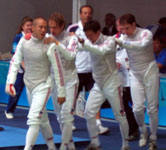Sport Performance
Check out the Peak Performance Website for more information on what tools you could use to perform your best.
Step 1: Assessment
Most physiological processes related to stress are unconscious; people are not aware of them. High-level performers frequently experience intense physical and mental challenges which put their physiological responses into high gear. The resulting wear and tear are called allostatic load. In time, the cumulative effects of repeated or chronic stress can cause damage to a person’s body.
Teaching self-regulation skills to high-level performers gives them the ability to reset their autonomic balance and restore a healthy point of equilibrium. It also enhances a person’s perceptions of control and increases confidence.
With biofeedback measures related to peak performance, we provide psychophysiological assessment and training tools for both amateur and professional athletes, performing artists, and business people.
We can provide all you need to evaluate and train critical physiological processes essential to peak performance, such as periodic assessment of a person’s status, generate easy-to-understand reports to help track progress, and use physiological and neurological self-regulation training to improve physiological resilience.
Individualized programs are developed through assessment of psychological strengths and weaknesses.
These findings are combined with sport-specific questionnaires that measure the athlete’s mental skills in their sport. Finally, a clinical athlete interview is conducted to understand the athlete’s goals in their sport.
Step 2: Mental Skills Training
Athletes are given a set of tools to improve their mental game.
These include:
- Effective goal setting: Realizing your potential requires a smart and organized plan
- Focusing Training: We teach you the process of focusing to help you improve your performance, involvement and enjoyment in your sport.
- Relaxation strategies: Peak performers possess a set of self-regulation tools to help them develop the optimal level of tension.
- Visual Imagery/ Mental Rehearsal: When we “see” ourselves performing successfully we lay a foundation for future success.
- Mindfulness Training: We integrate mindfulness training in our work with athletes to help them achieve stronger focus and a quieter, less judgmental mindset.
- Reaction Time Training: We use cutting edge Reaction Time Training to help athletes optimize their performance. Reaction time training combines biofeedback with sport-specific protocols to help athlete’s reach their full potential.
- Decision Making: The stress of competition can strain our ability to make clear and effective decisions that are crucial to peak performance.
- Motivation: Athletes sometimes find themselves struggling through a period of time when they lack their usual fire.
- Return from Injury: Injuries can take a great emotional toll on serious athletes. Additionally, returning from injury and thriving in your sport after an injury can be a difficult transition.
- Goal Setting: Setting the ‘right’ goals and understanding how to effectively monitor your progress helps you work toward goals more effectively.
Step 3: In the Field
We often get out of the office and work with clients on their field of play. Taking the work out of the office helps optimize the psychological tools we teach and solidify them for the stress of competition. Dr. Udewitz serves as a consulting psychologist for the US Olympic Fencing Team. He has helped the athletes prepare for each Olympic Games since Athens in 2004. Dr. Udewitz is currently helping athletes prepare for the 2020 Olympics in Tokyo, Japan. Read about this sport psychology consulting here.

Dr. Udewitz began working with athletes in 2004 helping American fencers prepare for the Games.
Contact Behavior Therapy of New York to start improving your mental approach and sport performance.




